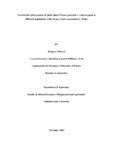Please use this identifier to cite or link to this item:
https://cris.library.msu.ac.zw//handle/11408/2463Full metadata record
| DC Field | Value | Language |
|---|---|---|
| dc.contributor.author | Rungano, Dickson | - |
| dc.date.accessioned | 2017-07-04T08:02:19Z | - |
| dc.date.available | 2017-07-04T08:02:19Z | - |
| dc.date.issued | 2015-11 | - |
| dc.identifier.uri | http://hdl.handle.net/11408/2463 | - |
| dc.description.abstract | Spider plant (Cleome gynandraL.) is an important indigenous vegetable in Zimbabwe whose demand is increasing across all social classes due to high nutritional and medicinal qualities. Lack of efficient production technologies is leading to under utilization of its genetic potential hence growing demand cannot be met by current methods used by smallholder farmers. In view of this, a field experiment was carried out at Musena Resettlement area in Chirumanzu District to assess the performance of spider plant under different populations intercropped with cowpeasin the 2014/15cropping season. The field experiment was laid out in a Randomised Complete BlockDesign (RCBD) consisting of seven treatments replicated three times. The treatments were three spider plant sole crops at populations of 37037, 74074 and 111111 plants/ha and sole cowpea at 111111 plants/ha. The other three treatments were intercrops of the three stated spider plant populations to which cowpea was added at 55555 plants/ha. The measurements taken were spider plant height, number of shoots and fresh shoot weight. Grain weight was measured for cowpea and the LER was calculated. There were significant (p<0.05) differences in all parameters measured, among the treatments. Spider plant was shortest when intercropped at 74074 plants/ha at five weeks after planting (WAE). Intercrop at 111111 plants/ ha had the highest number of shoots/ha but the fresh shoot yield was statistically similar to intercrop at 74074 plants/ha. The sole crop intercrop at 111111 plants/ha had the highest number of shoots/ha but fresh shoot yield was highest (3.2t/ha) for intercrop at 74074 plants/ha. Cowpea intercropped with spider plant at 111 111 plants/ha had the lowest (1,704t/ha) grain yield compared to intercrop at 74074 plants/ha (2.019t/ha). The highest LER (1.31) was achieved by intercropping spider plant and cowpeas at 74074 and 55 555 plants/ha, respectively. It can be concluded that intercropping spider plant at 74074 results in 31% higher yield compared to sole cropping. | en_US |
| dc.language.iso | en | en_US |
| dc.publisher | Midlands State University | en_US |
| dc.subject | Intercropping | en_US |
| dc.subject | Spider plant | en_US |
| dc.title | Growth and yield response of spider plant (Cleome gynandra L.) intercropped at different populations, with cowpea (Vigna unguiculata L. Walp) | en_US |
| item.languageiso639-1 | en | - |
| item.fulltext | With Fulltext | - |
| item.grantfulltext | open | - |
| Appears in Collections: | Bsc Agronomy Honours Degree | |
Files in This Item:
| File | Description | Size | Format | |
|---|---|---|---|---|
| Dickson.pdf | Full Text | 567.37 kB | Adobe PDF |  View/Open |
Page view(s)
204
checked on Apr 14, 2025
Download(s)
134
checked on Apr 14, 2025
Google ScholarTM
Check
Items in MSUIR are protected by copyright, with all rights reserved, unless otherwise indicated.



